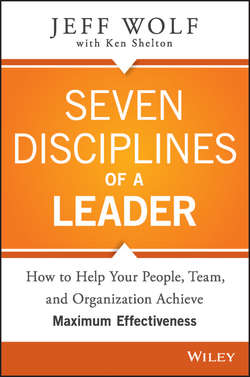Читать книгу Seven Disciplines of A Leader - Wolf Jeff - Страница 17
На сайте Литреса книга снята с продажи.
I
The Nature of Highly Effective Leadership
1
Welcome to Leadership
Nature of the Job
Leading in Uncertain Times
ОглавлениеThe role of leaders in uncertain times transcends managing the bottom line. It requires remembering that their first priority is employees. Great leaders never forget that their employees are the keys to success.
As an executive coach, consultant, and former CEO, I've worked with hundreds of leaders who perpetuate the growth of their companies, departments, or teams. I find that successful leaders practice four simple leadership skills, all based on developing people. Implementing these skills keeps people focused, reduces anxieties and fears, reduces turnover, and makes employees feel loyal and positive about the company.
1. Communication. The late Sam Walton, founder of Walmart, said, “Communicate everything to your associates; the more they know the more they care. Once they care, there is no stopping them.” Because of the downturn in the economy, people feel vulnerable and overwhelmed. They are also worried about cutbacks and layoffs. Communicate everything to them by letting them know what is happening in your company, team, or department. Open the lines of communication with everyone and let them know that you care not only about their involvement in the workplace, but in their personal lives as well. A leader places a high value on human capital.
2. Praise. When you praise people you inspire loyalty and encourage them to perform great work. Praising also creates positive energy in companies when people are continually being praised for doing good work. Great leaders go out of their way to praise people; they catch people doing something right! When praising people, do it in a timely fashion, make it specific, and try to do it in front of their peer group. Use such statements as: Thanks for getting that report in so quickly. You handled that situation nicely. That was an interesting point you brought up. We couldn't have done it without your help. I can see you're improving in that area; keep up the good work. Your contribution is making a difference on this project. Praising your people will keep them motivated, inspired, and full of positive energy.
3. Empowerment. Great leaders know that they need to create more leaders at all levels. Empower your people; nurture their development as leaders. Don't just delegate work; delegate decision-making powers to people. When people have the authority to make important decisions, they feel part of the organization, and they're more likely to remain part of it. By empowering your people, you enable them to reach their potential. When you fail to empower people, barriers are created that people can't overcome. If these barriers remain long enough people give up and leave. Many of those people go on to become great leaders at other organizations.
4. Coaching. Coaching boosts productivity, builds teamwork, motivates employees to elevate performance levels, and helps people overcome obstacles to their success. A great leader spends time working with individuals to see the blocks in their performance. A successful leader and effective coach are one in the same. People won't change until they see the need to. Good coaches listen to people to find ways to break down the barriers that keep people from reaching their full potential. They then work with their people to outline a plan of action that clearly states the goals for improvement and accountability. Coaching helps people learn, grow, and change. It provides a powerful structure through which people can focus on specific outcomes, become more effective, and stay on track.
Uncertainty calls for strong leaders who guide people through troubling and turbulent times. Inspire and motivate your people to help them adjust and be productive employees. By utilizing these four leadership skills, you can change attitudes and create a positive and nurturing environment.
